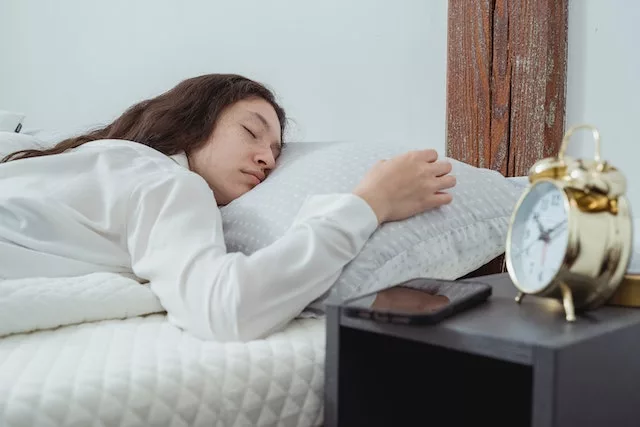Sleep is a vital aspect of our overall well-being, and hormonal balance plays a crucial role in ensuring a restful and rejuvenating slumber. Our body’s intricate hormonal system regulates various sleep-related processes, including sleep-wake cycles and sleep quality. In this article, we will explore the role of hormones in sleep and discuss natural ways to improve hormone health for better sleep.
Melatonin
The Sleep Hormone Melatonin, often referred to as the “sleep hormone,” is responsible for regulating our sleep-wake cycles. It is produced by the pineal gland in response to darkness, signaling to the body that it is time to sleep. Melatonin levels typically rise in the evening, helping us fall asleep, and decrease in the morning, promoting wakefulness. To enhance melatonin production, consider the following tips:
- Maintain a consistent sleep schedule: Establish a regular sleep routine, going to bed and waking up at the same time each day, even on weekends.
- Create a sleep-friendly environment: Keep your bedroom dark, quiet, and cool. Use blackout curtains, earplugs, or a white noise machine if necessary.
- Limit exposure to bright lights before bed: Minimize exposure to electronic screens and bright lights, as they can suppress melatonin production. Opt for dimmer lighting and engage in relaxing activities instead.
Cortisol
The Stress Hormone Cortisol, often referred to as the “stress hormone,” plays a significant role in regulating our sleep patterns. When cortisol levels are elevated due to stress or other factors, it can interfere with sleep quality. To balance cortisol levels and improve hormone health:
- Practice stress management techniques: Engage in activities such as deep breathing exercises, meditation, or yoga to reduce stress and promote relaxation before bed.
- Establish healthy coping mechanisms: Find healthy ways to manage stress during the day, such as regular exercise, spending time in nature, or engaging in hobbies you enjoy.
- Prioritize self-care: Take time for self-care activities, such as taking baths, reading, or practicing mindfulness, to promote relaxation and reduce cortisol levels.
Estrogen and Progesterone
Hormones in Women’s Sleep Estrogen and progesterone, two primary female hormones, can influence sleep patterns. Fluctuations in these hormones during the menstrual cycle, pregnancy, and menopause can impact sleep quality. To support hormone health and improve sleep for women:
- Follow a balanced diet: Consume a nutrient-rich diet that includes whole foods, fruits, vegetables, and lean proteins to support hormone balance.
- Regular physical activity: Engage in regular exercise, such as walking, swimming, or yoga, as it can help regulate hormone levels and improve sleep.
- Seek hormonal support if needed: Consult with a healthcare professional if you experience persistent sleep disturbances related to hormonal imbalances. They may recommend hormonal therapies or natural supplements to support hormone health and sleep.
Ghrelin and Leptin
Hormones Affecting Appetite and Sleep Ghrelin and leptin are hormones that regulate appetite and hunger signals. Disruptions in these hormones can affect sleep patterns and lead to imbalances in eating habits. To promote hormone health and better sleep:
- Establish a balanced eating routine: Aim for regular meals and snacks throughout the day to maintain stable ghrelin and leptin levels.
- Choose nutrient-dense foods: Prioritize a diet rich in whole grains, lean proteins, fruits, and vegetables to support hormone balance and overall well-being.
- Avoid heavy meals close to bedtime: Eating large, heavy meals close to bedtime can disrupt digestion and hinder sleep quality. Opt for light, nutritious snacks if needed.
Achieving restful and rejuvenating sleep is essential for our overall health and well-being. We can enhance our sleep quality naturally by understanding the role of hormones in sleep. Prioritize consistent sleep routines, manage stress levels, support hormone balance through nutrition and exercise, and seek professional guidance when needed. Remember, a healthy hormone balance contributes to better sleep and sets the stage for optimal physical and mental wellness.
Photo by Miriam Alonso
Sleep
-

How to Snack at Night to Sleep Well?
Snacking is a common part of modern eating habits, often providing a source of comfort and satisfaction. However, the timing and content of these snacks can have significant effects on various aspects of health, including sleep. In this article, we will explore the relationship between late-night snacking and sleep, highlighting the potential impacts on sleep…
-

What is a Sleep Log and why you need one: Unlocking the Secrets to Better Rest and Overall Health
-

Exploring the Relationship Between Intermittent Fasting and Sleep Quality
-

The Role of Hormones in Sleep and Natural Ways to Improve Hormone Health for Better Sleep
-

The Powerful Diet and Sleep Connection: Understanding the Impact
-

How to master the Art of Power Naps: A Guide to Healthy and Effective Power Naps
-

7 Essential Oils in Aromatherapy to Promote Sleep








Leave a Reply